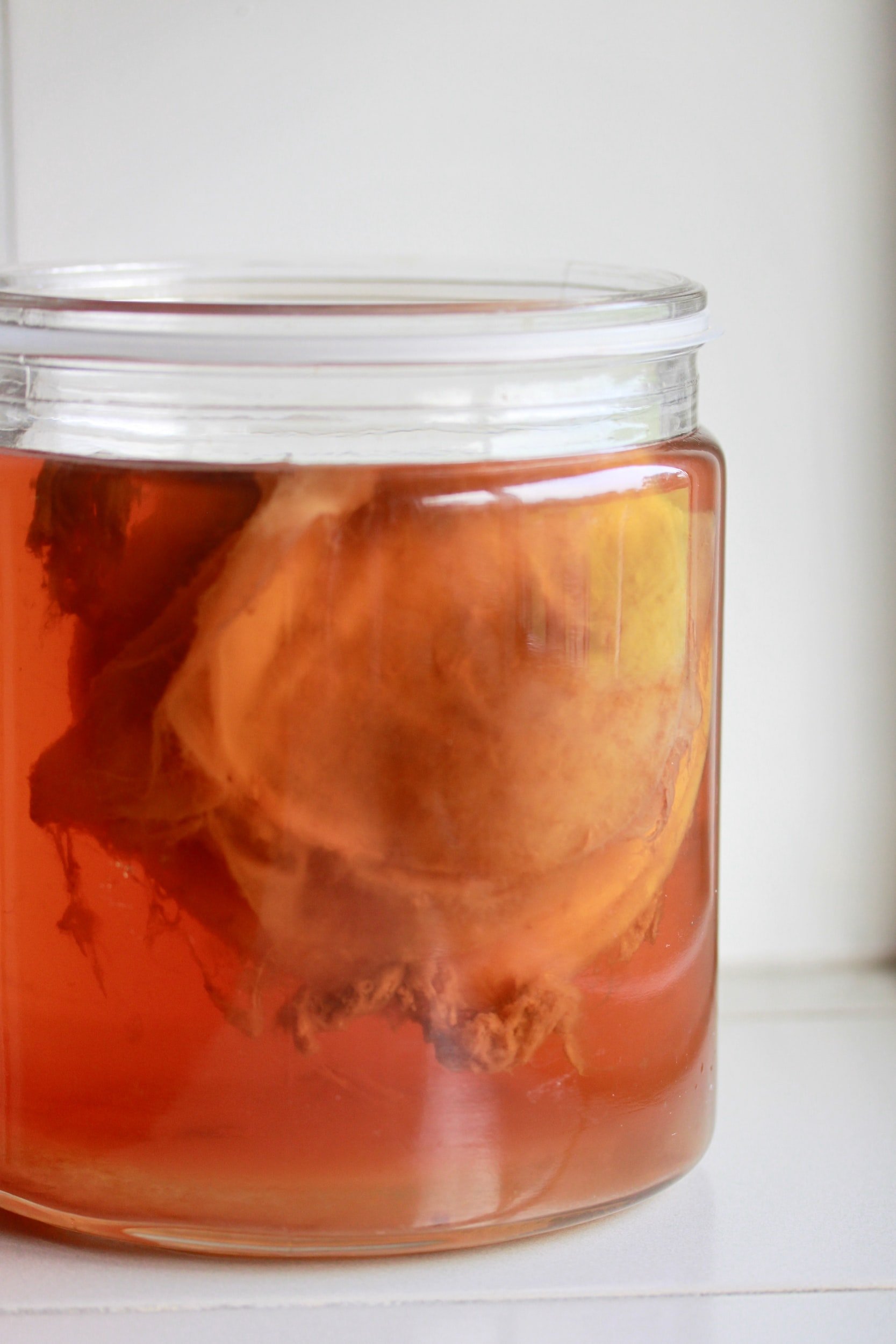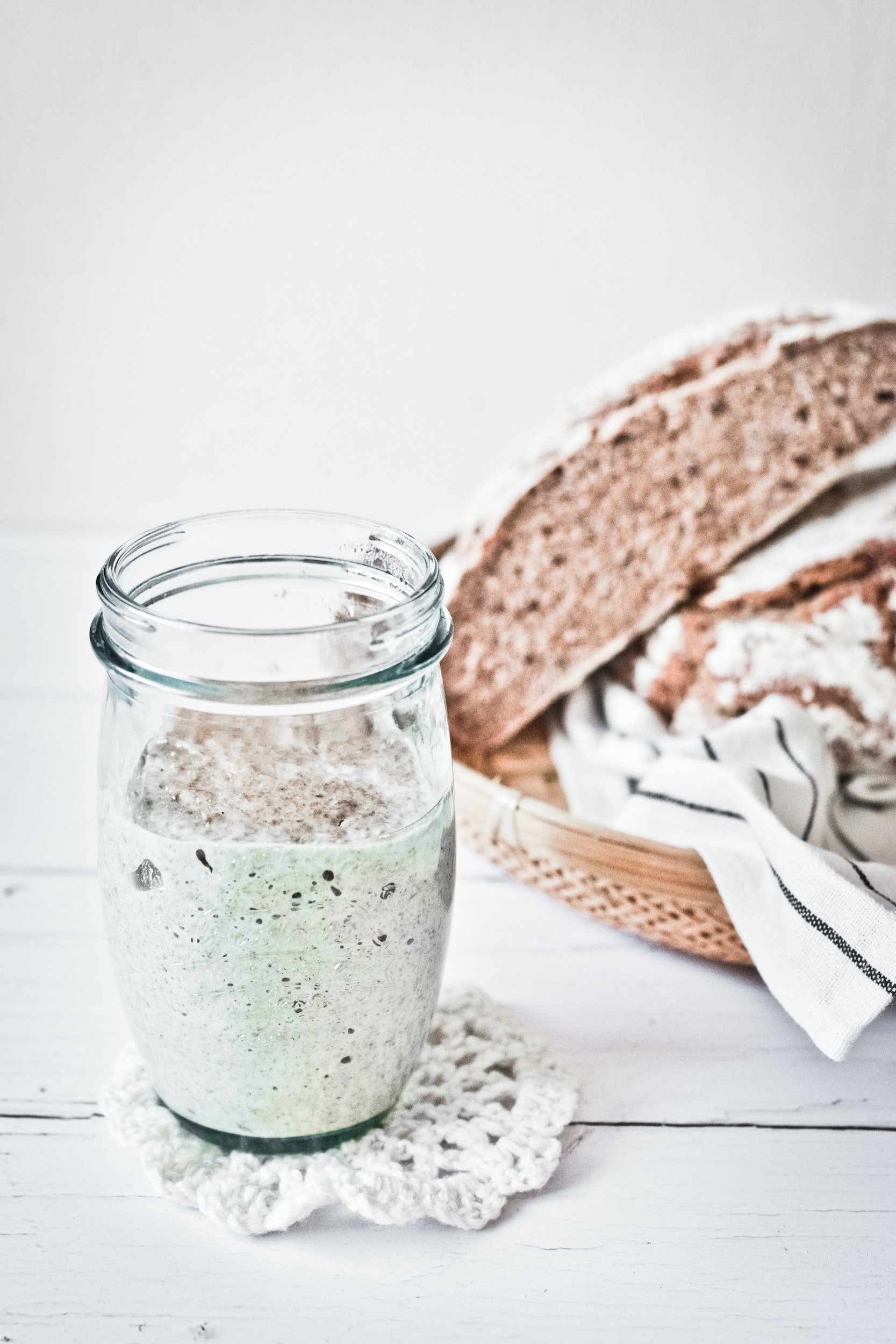Once upon a time, long, long ago (okay, three years ago), I interviewed for a job at a certain Cambridge-based natural foods store. And during that interview, I got a little sidetracked talking about how much I love to ferment things. Bread, yogurt, pickles--everything. "I just really like microbes," I said.
Anyway, I got the job. And I'm still super into fermentation. I'm a kombucha maker, a pickled-vegetable devotee, and a sourdough master. And all of this is possible with a friendly little fungus called yeast.
Yeast is a broad category for a type of single-celled organism in Kingdom Fungi. This little fungi lives everywhere around us--on plants, on surfaces, and even on human skin (more on that later). Historical research shows that yeast is one of the earliest known domesticated organisms from its use in beer brewing and breadmaking; archaeological research sites in Israel bear evidence of cultivated yeast colonies from 5,000 years ago!
A kombucha scoby - wild looking!
Yeast, as a general rule, is a fairly simple creature. It consumes sugar and converts it to alcohol, carbon dioxide, and other compounds. Early humans realized this and took advantage of it: yeast's fermentation is what's responsible for the tangy flavor and spongy texture of sourdough bread, as well as the pleasant fizziness and acidity of both kombucha and beer. Early humans, lacking microscopes, considered the fermentation process to be quite magical and mystical (check out this book if you're interested in the sacred origins of fermentation)!
But yeast is also particular in that it is also quite temperature sensitive. Its growth can be slowed down by cooling it (such as temporarily keeping a sourdough starter in the refrigerator between uses), but it can also be 'deactivated', or killed, by raising it to high temperatures. This renders the yeast unable to ferment (which is what makes it different from the yeast used in baking) but unlocks some unique health benefits.
The primary form of deactivated yeast you'll find is saccharomyces cerevisiae, colloquially known as nutritional yeast (or, as its fans call it, 'nooch'). Nutritional yeast is cultivated on a sugar medium (usually molasses or sugarcane) before being deactivated with heat, then washed and dried. It's high in B vitamins (especially thiamin and riboflavin) and iron.With its savory, cheesy flavor, it can be used for a variety of different things, from topping popcorn and pasta to making tasty vegan 'cheese' sauces.
Sourdough starter yum yum yum
A slightly different type of yeast, saccharomyces boulardii, is sometimes used as a probiotic. Studies have shown it to be beneficial in keeping the balance between 'good' and 'bad' bacteria in the gut microbiome, as well as for preventing gastrointestinal distress caused by improper diet or use of antibiotics.
Yeast does, however, have its drawbacks. An overgrowth of a certain type of yeast known as candida albicans in the body can cause an unpleasant infection in the mouth or genitals. Candida albicans is quite different from the yeasts used in brewing and baking, and can be kept in check with the help of another friendly bacteria called Lactobacillus. So no, you can't get a yeast infection by drinking too much kombucha--but drinking kombucha may actually help to regulate your yeast balance!
Ahh, yeast. So many things are possible with the help of this tiny, nearly-invisible organism. So next time you enjoy a brew at your local pub, or snack on some tasty sourdough from that phenomenal cafe down the street, give a little thanks to the microbe that makes so many cool (and delicious) things happen.
Here are some of my favorite yeast-based products at Cambridge Naturals:
Bjorn Qorn: At CN, we're all avid devotees of this solar-popped snack. It comes in a few delicious flavors, but I love the original, topped with salt and nutritional yeast.
Rawmesan: If you're looking to upgrade your pasta game, a sprinkling of Rawmesan may be all you need. Made with walnuts, sunflower seeds, and nutritional yeast, it's a delightful vegan and gluten-free condiment to have in your pantry.
Siete Cashew Queso: Hey, nobody said eating vegan had to be healthy. A classic bright-orange queso to serve with tortilla chips and salsa during the big game, this is one of my favorite indulgences at Cambridge Naturals.
Revival Homestead Kombucha SCOBY: This strange-looking thing is a SCOBY (Symbiotic Culture of Bacteria and Yeast) and can be used to brew a virtually infinite amount of kombucha. While you can technically culture your own SCOBY from scratch, it's a lot quicker and easier to use a premade one. So if you're interested in brewing your own 'booch but don't know where to start, this is a great beginning point.
Bulk Organic Nutritional Yeast Flakes: The basic and the best. I love experimenting with this stuff in recipes!
Sources:
https://www.britannica.com/science/yeast-fungus
https://www.webmd.com/diet/ss/slideshow-yeast-and-your-body
https://www.rxlist.com/saccharomyces_boulardii/supplements.htm


